As we get older, our bodies undergo numerous changes, one of the most common and significant being the loss of muscle mass. This can start are early as your 30s and speeds up with increasing age.
One of the main problems muscle loss brings is the increased risk of falls and fractures. Falls can lead to serious injuries, such as hip fractures, which can have a significant impact on quality of life and independence.
Another major problem associated with muscle loss is the impairment of physical function and the ability to simply move around independently.
As muscle mass and strength decrease, everyday activities like dressing and bathing can become difficult, leading to increased dependence on others and a reduced quality of life.
Recent Research on Aging-Related Muscle Loss
While the exact cause of aging-related muscle loss hasn’t been identified, researchers believe genetics, insulin resistance, chronic inflammation, chronic diseases, malnutrition, unintentional weight loss, lack of physical activity, and other factors, are involved.
Recent research findings have provided more insight. One interesting insight being that muscle loss can start far earlier than you might think.
While aging-related muscle loss has long been linked to older people, research shows this process can begin as early as your 30s and doesn’t look the same in every person.
While aging-related muscle loss has long been ignored and under-treated in mainstream practice, this may be changing. Doctors now know that exercise and better nutrition can help fight aging-related muscle loss.
Practical and Simple Solutions
Though there is still much to learn about aging-related muscle loss, there are practical and simple solutions you can take to prevent or slow its progression.
Regular checkups: See your doctor for regular checkups. If spotted early, you can get a head start on aging-related muscle loss, which will help you in the long-term.
Stress management and sleep: Stress management, and adequate sleep are essential for overall health and can indirectly contribute to muscle health by reducing inflammation and promoting tissue repair.
Exercise: Exercise is one solution that has been shown to help with age-related muscle loss. Resistance training, such as strength or weight training, has consistently been shown to improve muscle mass, strength and function in older adults. Aerobic exercise can also support muscle health through its effect on cardiovascular health and endurance.
Prioritize adequate protein intake: Consume enough high-quality protein, such as lean meats, fish, eggs, and dairy products. This will provide you with a well-rounded mix of essential amino acids (EAAs), ensuring your body has the necessary building blocks to maintain muscle health. In addition, try to eat protein throughout the day during every meal.
EAA Supplements: If you struggle to eat enough protein, consider incorporating an EAA supplement. This will help you maintain muscle health and can boost the effects of exercise.
Amino Acids: The Building Blocks of Healthy Aging
Amino acids, the building blocks of proteins, play a crucial role in aging-related muscle health.
Among the 20 amino acids, 9 are considered essential, meaning they cannot be made by the body and must be obtained through our diet.
However, as you get older, it becomes progressively more difficult to digest protein and absorb these amino acids. Additionally, as you age, your body becomes less efficient at stimulating muscle protein synthesis (MPS).
And if you don’t get enough EAAs in your diet, or are not efficiently absorbing them from your food, your body will tap into its muscles in order to maintain the proper balance of amino acids in the bloodstream.
This balance ensures a steady supply of amino acids in order to keep critical systems running.
Kion Aminos
Kion Aminos, a scientifically validated blend of all 9 EAAs, offers an optimal solution for individuals looking to support muscle health during the aging process.
It provides all nine EAAs, ensuring that your body has the necessary building blocks for MPS and muscle maintenance.
Because Kion Aminos requires little absorption, stimulates MPS to a greater degree than dietary protein, and is 100% EAAs, it is all the more important for anyone over the age of 30.
Made with natural flavors, sugar-free, and no caffeine, artificial sweeteners, stearates, coatings, dyes, Kion Aminos won’t negatively impact your gut health or give you the nervous energy and jitters that other muscle-building supplements can cause.
Summary
Aging-related muscle loss is a significant concern for older adults, but it’s something that you can act on today.
By getting regular checkups, reducing stress, getting enough good sleep, engaging in exercise, prioritizing protein intake, and considering targeted supplementation with EAA supplements like Kion Aminos, you can take steps to maintain muscle health, retain your vitality, and age powerfully.
Combat aging-related muscle loss with Kion Aminos
Buy Now
Scientific Research
- American College of Sports Medicine, Chodzko-Zajko WJ, Proctor DN, et al. American College of Sports Medicine position stand. Exercise and physical activity for older adults. Med Sci Sports Exerc. 2009;41(7):1510-1530.
- Breen L, Phillips SM. Skeletal muscle protein metabolism in the elderly: Interventions to counteract the 'anabolic resistance' of ageing. Nutr Metab (Lond). 2011;8:68.
- Chen N, He X, Feng Y, Ainsworth BE, Liu Y. Effects of resistance training in healthy older people with sarcopenia: a systematic review and meta-analysis of randomized controlled trials. Eur Rev Aging Phys Act. 2021;18(1):23.
- Church DD, Hirsch KR, Park S, et al. Essential amino acids and protein synthesis: insights into maximizing the muscle and whole-body response to feeding. Nutrients. 2020;12(12):3717.
- Coletta G, Phillips SM. An elusive consensus definition of sarcopenia impedes research and clinical treatment: A narrative review. Ageing Res Rev. 2023;86:101883.
- Cruz-Jentoft AJ, Bahat G, Bauer J, et al. Sarcopenia: revised European consensus on definition and diagnosis. Age Ageing. 2019;48(1):16-31.
- Cvečka J, Vajda M, Novotná A, Löfler S, Hamar D, Krčmár M. Benefits of Eccentric Training with Emphasis on Demands of Daily Living Activities and Feasibility in Older Adults: A Literature Review. Int J Environ Res Public Health. 2023;20(4):3172.
- Dent E, Morley JE, Cruz-Jentoft AJ, et al. International Clinical Practice Guidelines for Sarcopenia (ICFSR): Screening, Diagnosis and Management. J Nutr Health Aging. 2018;22(10):1148-1161.
- Deutz NE, Bauer JM, Barazzoni R, et al. Protein intake and exercise for optimal muscle function with aging: recommendations from the ESPEN Expert Group. Clin Nutr. 2014;33(6):929-936.
- Drummond MJ, Rasmussen BB. Leucine-enriched nutrients and the regulation of mammalian target of rapamycin signalling and human skeletal muscle protein synthesis. Curr Opin Clin Nutr Metab Care. 2008;11(3):222-226.
- Fragala MS, Cadore EL, Dorgo S, et al. Resistance Training for Older Adults: Position Statement From the National Strength and Conditioning Association. J Strength Cond Res. 2019;33(8):2019-2052.
- Fujita S, Volpi E. Amino acids and muscle loss with aging. J Nutr. 2006;136(1 Suppl):277S-80S.
- Kirwan RP, Mazidi M, Rodríguez García C, et al. Protein interventions augment the effect of resistance exercise on appendicular lean mass and handgrip strength in older adults: a systematic review and meta-analysis of randomized controlled trials. Am J Clin Nutr. 2022;115(3):897-913.
- Laskou F, Patel H, Cooper C, Dennison E. Functional capacity, sarcopenia, and bone health. Best Pract Res Clin Rheumatol. 2022;36(3):101756.
- Negro M, Segreto V, Barbero M, et al. Essential Amino Acids (EAA) Mixture Supplementation: Effects of an Acute Administration Protocol on Myoelectric Manifestations of Fatigue in the Biceps Brachii After Resistance Exercise. Front Physiol. 2018;9:1140.
- Phillips SM, Van Loon LJ. Dietary protein for athletes: from requirements to optimum adaptation. J Sports Sci. 2011;29 Suppl 1:S29-S38.
- Piovezan RD, Abucham J, Dos Santos RV, Mello MT, Tufik S, Poyares D. The impact of sleep on age-related sarcopenia: Possible connections and clinical implications. Ageing Res Rev. 2015;23(Pt B):210-220.
- Rondanelli M, Nichetti M, Peroni G, et al. Where to Find Leucine in Food and How to Feed Elderly With Sarcopenia in Order to Counteract Loss of Muscle Mass: Practical Advice. Front Nutr. 2021;7:622391.
- Ten Haaf DSM, Nuijten MAH, Maessen MFH, Horstman AMH, Eijsvogels TMH, Hopman MTE. Effects of protein supplementation on lean body mass, muscle strength, and physical performance in nonfrail community-dwelling older adults: a systematic review and meta-analysis. Am J Clin Nutr. 2018;108(5):1043-1059.
- United States Census Bureau. The graying of America: more older adults than kids by 2035. https://www.census.gov/library/stories/2018/03/graying-america.html. Accessed March 29, 2023.
- Volpi E, Campbell WW, Dwyer JT, et al. Is the optimal level of protein intake for older adults greater than the recommended dietary allowance?. J Gerontol A Biol Sci Med Sci. 2013;68(6):677-681.
- Volpi E, Nazemi R, Fujita S. Muscle tissue changes with aging. Curr Opin Clin Nutr Metab Care. 2004;7(4):405-410.
- Wu G. Dietary protein intake and human health. Food Funct. 2016;7(3):1251-1265.
- Yoshimura Y, Bise T, Shimazu S, et al. Effects of a leucine-enriched amino acid supplement on muscle mass, muscle strength, and physical function in post-stroke patients with sarcopenia: A randomized controlled trial. Nutrition. 2019;58:1-6.



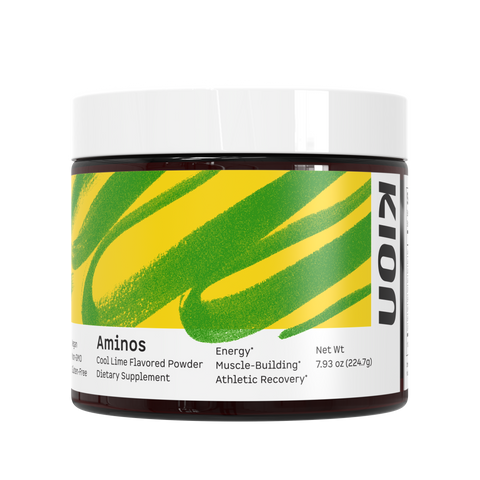
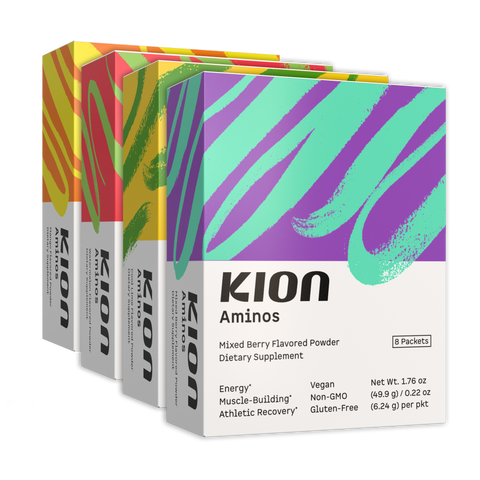
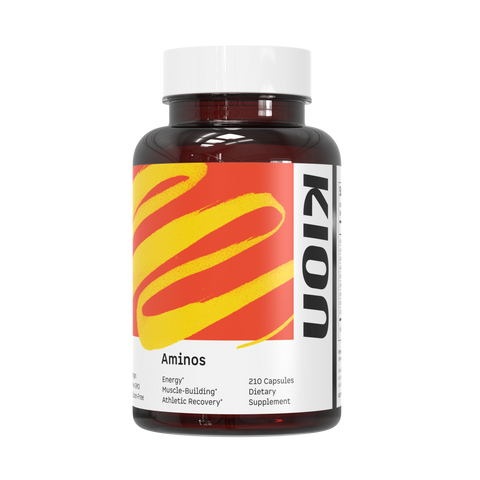
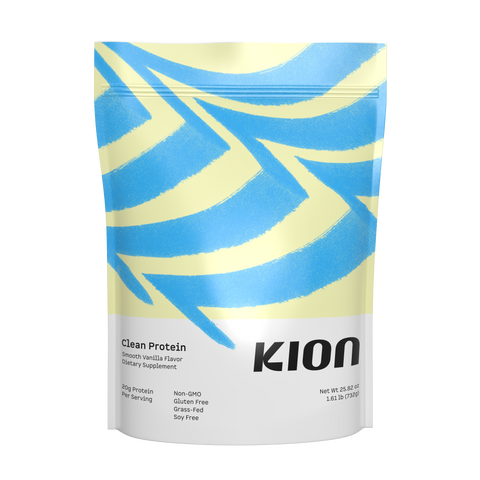
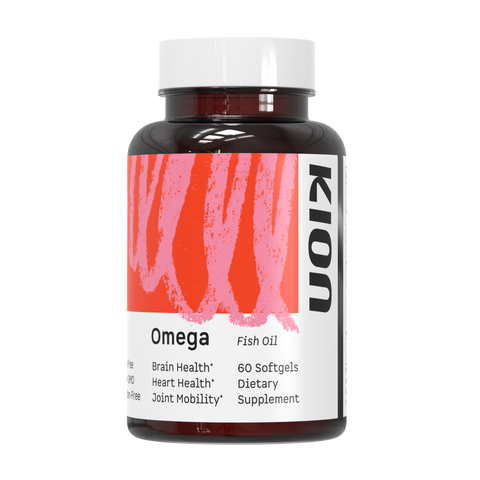
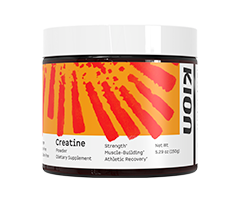

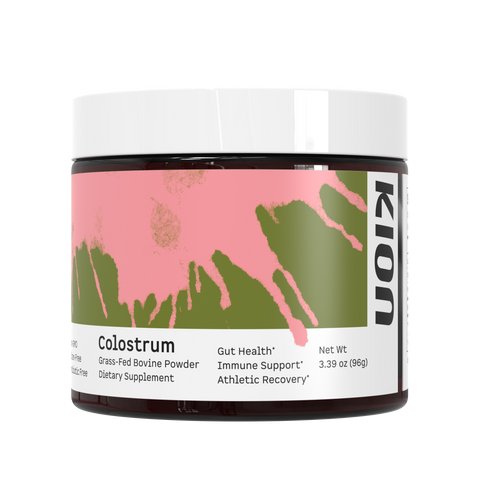








Comments
I purchased the amino capsules and the instructions say to take 6 immediately after a workout. I don’t work out everyday but I do want the benefit of amino acid supplementation as I am on a GLP-1 and am 66 years young. I definitely struggle to get the protein in my daily diet.Perhaps the capsules were not the better form of Kion products for me but can I use these daily ?
———
Kion replied:
Hi Laurie, you can certainly use Aminos daily! One thing though, a serving is 7 capsules, and you can take them any time, doesn’t have to be around a workout. For someone in your situation, I’d recommend taking them 3 hours away from any protein you’re consuming (to get the maximum benefit). Also, just like protein, you can take multiple servings per day, and at a time. If you need any more support, please contact one of our live customer service reps. They’ll be happy to talk to you and answer any further questions! 855-387-KION (5466)
Laurie Raleigh on
just curious if you should drink the amino acids all at once or if they can be sipped throughout a workout?
———
Kion replied:
They certainly can be sipped on, but as they are rapidly absorbed, ideally one would consume an entire serving (or more) within a roughly 30 time frame to elicit “peak” muscle protein synthesis.
Mary ann on
Hello. I purchased the Aminos Powder but I am wondering when the best time for me to take it. I work out first thing in the morning is a fasted state. Usually strength training but some HIIT and other cardio on occasion. Should I take the Aminos before I workout? And what about my off days? Thanks!
———
Kion replied:
Kion Aminos are extremely flexible in their timing, really any time of day (even with meals) is great! The most important factor to actually see and feel results is consistent, daily usage, especially on non-workout days as we don’t have the additional stimulus from our workout to increase protein synthesis. In the case of early, fasted workouts, especially strenuous HIIT or strength workouts, we highly recommend taking at least one serving within 30 min prior to your workout. This will not only help to alleviate some of the protein breakdown from your workout and provide some additional energy, but the additive effect of training combined with EAA’s will stimulate muscle protein synthesis to a greater degree than either will in isolation.
Kelly McKelvey on
HI, Love getting enough amino acids as a vegetarian , but I’d prefer to have an unflavored option. Wondering why you don’t have that one, and I don’t like the taste of Stevia, I find monkfruit a better flavor. Is there a reason why you don’t use that instead of Stevia? Thanks.
———
Kion replied:
We do produce an unflavored capsule form containing the same quantity of EAA’s in the same ratios! As for monk fruit, you will find that all flavors (save Cool Lime) use a combination of both stevia leaf and monk fruit extracts.
Cheryl on
Can any elderly person benefit from KION Aminos? I read that elderly with kidney issues should not be taking Amino Acid supplements. Could you explain why?
———
Kion replied:
Simply put? Yes, Kion aminos can be hugely beneficial for all populations, especially elderly. The importance of muscle tissue and protein intake in the elderly has been very well established, however as we age we also begin to lose efficiency in our ability to extract essential amino acids from dietary sources. Kion aminos exist in a free-form state, as opposed to “in-tact” proteins that require digestion, thus are much more readily absorbed. As for Kidney function, much of the research suggests that this can be attributed to a lack of essential amino acids, or rather an imbalance between NEAA’s (non-essential aminos) and EAAs. In order for muscle tissue to “uptake” amino acids, there must be a presence of essential amino acids, otherwise the excess NEAA’s must be filtered out, thereby increasing uric acid production, increasing the load on filtering organs. This is part of the reason why we do not recommend supplementation of BCAA’s that lack all 9 essential amino acids.
Marie on